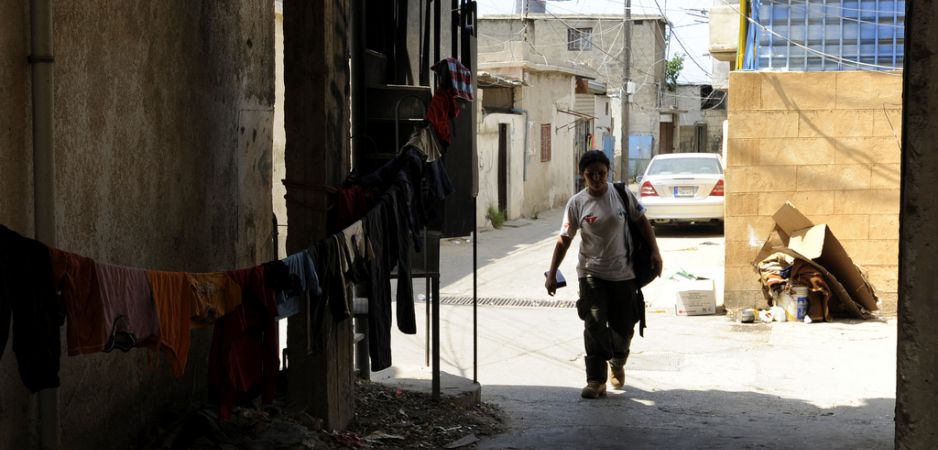With over 7 million refugees worldwide, Palestinians are stuck in limbo. Chaker Khazaal explains.
The poor conditions of the Bourj El Barajneh Palestinian camp in Lebanon led to the death of yet another refugee this summer.
A young man named Ahmad Kassab passed away shortly after being electrocuted by one of the many loose wires that drape the camp’s buildings and streets. The incident is disturbingly common. Camp officials reported that approximately 50 people have been electrocuted to death over a five year span.
The startling frequency of these accidents means that it won’t be long before Kassab becomes just another statistic in a long list of fatalities caused by the neglect of Palestinian refugees. It seems there is no end to the struggle for these people, who were displaced from their homeland in 1948.
Today, there are over 7 million Palestinian refugees worldwide. In the Bourj El Barajneh camp, there are over 28,000 refugees squeezed into just one square kilometer of land. The crumbling infrastructure is covered with a crisscross of electric wires that originate from a rusty and exposed power grid in the center of the camp, known to locals as the “Wall of Death.” Bourj El Barajneh is just one of 12 Palestinian refugee camps in Lebanon, which are in similar circumstances. Without help from the Lebanese government, the inhabitants of the camps are unable to fix the safety issues created by extreme overcrowding.
These dangerous living conditions are a direct result of a lack of funding for permanent solutions to the displacement of Palestinian people. In Lebanon, local laws place extreme limitations on employment opportunities, making it nearly impossible for most refugees to make a living.
The United Nations Relief and Works Agency for Palestinian Refugees (UNRWA) was founded in 1950 to provide direct work and relief programs for displaced Palestinians. Using almost exclusively voluntary funding from United Nations member states, primarily the United States, UNRWA has been able to provide some of the basic improvements that these camps so desperately need—but it is not nearly enough.
UNRWA has been especially vital to Palestinians who have sought refuge in Lebanon. This is because Lebanon has refused to grant citizenship to their refugees, which means they are denied many social rights, including access to government-run services such as education, health care and social security. Due to this, UNRWA is the only way for people in camps like Bourj El Barajneh to obtain these services.
Unfortunately, UNRWA’s assistance to Palestinians has been severely hampered in recent years due to chronic underfunding. The program estimated that it would begin 2015 with a $35 million deficit. While countries have since reached out to the program to provide additional funding, the fact remains that even with help from UNRWA, the conditions of the refugee camps continue to deteriorate.
Further compounding this problem is the Syrian Civil War, which has displaced another 325,000 Palestinians since it began. Bourj El Barajneh alone added another 3,000 refugees to its already severely overcrowded population. Organizations like UNRWA have been forced to redirect funding to aid these new refugees, leaving those already struggling to survive in camps like Bourj El Barajneh with even less assistance than before.
During the 2014 United Nations General Assembly, UNRWA’s deputy commissioner-general, Margot Ellis, spoke about how the conflict in Syria has made it difficult for the agency to continue assisting those who were already seeking refuge in places like Lebanon and Jordan.
“Both [Palestinian refugees in Lebanon and Jordan] are heavily affected by the crisis in Syria,” Ellis said. “But thankfully we have been able to maintain services for refugees and are even able to provide limited humanitarian assistance.”
“What is becoming increasingly clear, however, is that the agency is stretched beyond its means.” Ellis also described Palestinian refugees as being in a “65-year limbo, counting on the international community to find a solution to their plight.” While the description is accurate, it also underlines the fact that the world has moved on from the displacement of Palestinian people in 1948 without ever providing a permanent solution to the problem.
While UNRWA may be able to provide things like limited educational opportunities for children in refugee camps, most of them will only grow up to realize that there is little chance they will find a job that can provide a wage to sustain a family of their own. Without the resources to relocate, their children will be raised to follow the same path that they did. Thus, the vicious cycle continues.
The president of the Palestinian Authority, Mahmoud Abbas, has done little to alleviate the dire circumstances of his displaced people.
In 2014, he told a group of visiting Israelis that he did not wish to change Israel’s nature by “drowning it with millions of [Palestinian] refugees.”
Perhaps the worst part of Abbas’ statement is that while it expresses concern for himself and Israel, it does not in any way address how he plans to help the millions of suffering Palestinian refugees. Except for in title, Abbas seems to have all but abandoned his people.
While organizations like UNRWA may be able to provide short-term relief, it is imperative that the international community formulates a strategy to save Palestinians. Nobody deserves to live in conditions like that of Bourj El Barajneh and the other refugee camps. Instead of pouring money into aid programs, a majority of which have proved to be unsustainable, nations must focus their resources on providing a permanent home for Palestinian people.
What Next?
In August, Canadian Prime Minister Stephen Harper announced his party’s plans to launch a new program that would bring to Canada 10,000 refugees displaced by the Islamic State from Iraq and Syria. Harper’s plans set a model example for countries around the world who could do the same for Palestinians by providing a home, rather than spending money to keep them in run down, overcrowded camps.
As it stands, most Arab countries’ laws make it extremely difficult for refugees to obtain a work permit or visitor’s visa. Instead of helping them, these countries are cutting the last lifelines to society that these people have left.
Of all countries, the United States perhaps has the most to gain by providing a home to many Palestinians. The US has been regularly spending over $130 million a year to help UNRWA maintain aid to Palestinian refugees, and it has now spent over $5 billion just to keep these people at the bare minimum standards of living.
By using a program like Harper’s, the US government could bring tens of thousands of educated and skilled refugees to work and live in areas where there are needs for their specific profession. This would allow the US to redirect billions of dollars into its own economy, rather than spending it to keep Palestinians in overcrowded camps. The influx of population would be negligible to a country that already hosts over 40 million immigrants.
If the world cannot form a definitive plan of action to save displaced Palestinians, refugees like Ahmad Kassab will continue to perish every day. Those who survive must endure the hardships, with little hope that they will ever be able to have a chance in this life, or return to their home in Palestine.
The views expressed in this article are the author’s own and do not necessarily reflect Fair Observer’s editorial policy.
Photo Credit: Cluster Munition Coalition
 We bring you perspectives from around the world. Help us to inform and educate. Your donation is tax-deductible. Join over 400 people to become a donor or you could choose to be a sponsor.
We bring you perspectives from around the world. Help us to inform and educate. Your donation is tax-deductible. Join over 400 people to become a donor or you could choose to be a sponsor.
Support Fair Observer
We rely on your support for our independence, diversity and quality.
For more than 10 years, Fair Observer has been free, fair and independent. No billionaire owns us, no advertisers control us. We are a reader-supported nonprofit. Unlike many other publications, we keep our content free for readers regardless of where they live or whether they can afford to pay. We have no paywalls and no ads.
In the post-truth era of fake news, echo chambers and filter bubbles, we publish a plurality of perspectives from around the world. Anyone can publish with us, but everyone goes through a rigorous editorial process. So, you get fact-checked, well-reasoned content instead of noise.
We publish 2,500+ voices from 90+ countries. We also conduct education and training programs
on subjects ranging from digital media and journalism to writing and critical thinking. This
doesn’t come cheap. Servers, editors, trainers and web developers cost
money.
Please consider supporting us on a regular basis as a recurring donor or a
sustaining member.
Will you support FO’s journalism?
We rely on your support for our independence, diversity and quality.






